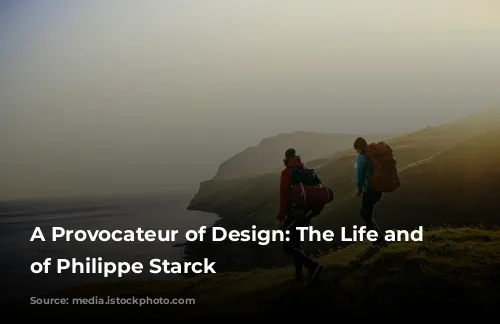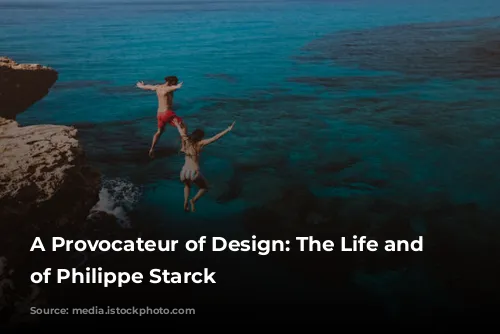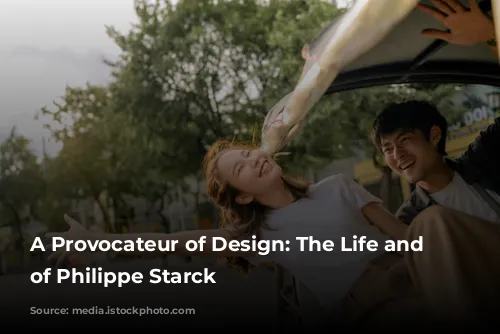Philippe Starck, a name synonymous with innovative design, was born in Paris in 1949. His journey began under the drafting table of his father, an inventor and aeronautics engineer, a setting that sparked his early fascination with design. While he formally studied at the École Camondo, Starck famously declared that he “learned nothing” there, relying instead on his innate curiosity.

The Early Years: A Spark of Innovation
Driven by his self-taught spirit, Starck established his own studio in Paris around 1968, focusing on inflatable designs. His collaboration with the master of blow-up furniture, designer Quasar Khanh, marked a pivotal moment in his early career. Just a year later, his inflatable structure at the Salon de l’Enfance caught the eye of fashion icon Pierre Cardin, who quickly offered him an art director position.

A Design Revolution: From Nightclubs to Global Recognition
The late 1970s saw Starck making his mark with nightclub interiors, transforming spaces like La Main Bleue in Montreuil and Les Bain Douches in Paris. As the 1980s dawned, he founded Starck Product, later renamed Ubik, a company that launched his furniture, lighting, and accessory designs into the mainstream. He began collaborating with iconic manufacturers like Alessi, Driade, Flos, Kartell, and Vitra, introducing his unique vision to a wider audience.

A Legacy of Iconic Designs: Shaping the World Around Us
A pivotal moment arrived in 1983 when French president François Mitterrand commissioned Starck to renovate the Élysée Palace. This prestigious project propelled him onto the international design stage, leading to a steady stream of commissions for restaurants and hotel interiors. His innovative touch can be seen in spaces like Café Costes in Paris, Manin in Tokyo, Theatron in Mexico City, and the iconic Royalton and Paramount hotels in New York City. The Delano Hotel in Miami Beach, a testament to his bold and luxurious style, solidified his status as a design superstar.

Beyond Furniture: A Visionary in Every Scale
In 1999, Starck co-founded Yoo, a design firm dedicated to residential and commercial interiors, expanding his reach into the world of architecture and urban design. His prolific career boasts an astounding array of iconic designs, including the Miss Dorn Chair, Pat Conley I Chair, J. Série Lang Chair, Hot Bertaa Kettle, Miss Donna Mirror, Lola Mundo Chair, Juicy Salif Lemon Squeezer, W.W. Stool, Louis 20 Chair, Miss Sissi Table Lamp, Vicieuse Coffee Table, Excalibur Toilet Brush, Jim Nature Portable Television, Rosy Angelis Lamp, Dr. No Chair, Dr. Scud Fly Swatter, La Marie Chair, Miss C.O.C.O. Folding Chair, Gnome Stools, Bubble Club Sofa, Hudson Chair, Louis Ghost Chair, and Guns Lamp.
Beyond furniture and product design, Starck embraced large-scale projects, leaving his indelible mark on spaces like the Alhóndiga Cultural & Leisure Centre in Bilbao, Port Adriano Harbor in Palma de Mallorca, Apple CEO Steve Jobs’s yacht, P.A.T.H Prefabricated Homes, and Le Nuage Sports Center in Montpellier. His work transcends mere design, embodying a commitment to functionality, aesthetics, and a touch of the unconventional.

A Master of His Craft: Recognition and Influence
Starck’s designs are celebrated in some of the world’s most prestigious museums, including the Musée National d’Art Moderne and Musée des Arts Décoratifs in Paris, MoMA and the Brooklyn Museum in New York, Vitra Design Museum in Weil am Rhein, and Design Museum London. The Pompidou Center honored him with a retrospective in 2003, solidifying his legacy as a visionary designer. Starck’s impact on the design world is undeniable, his work continues to inspire and influence generations of designers. He remains a true provocateur, a champion of democratic design, and a superstar on the international design scene. His legacy is one of innovation, bold creativity, and a relentless pursuit of design excellence.









